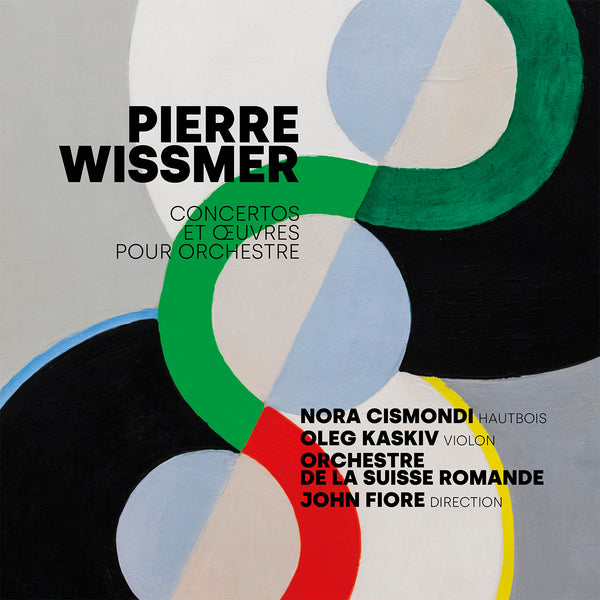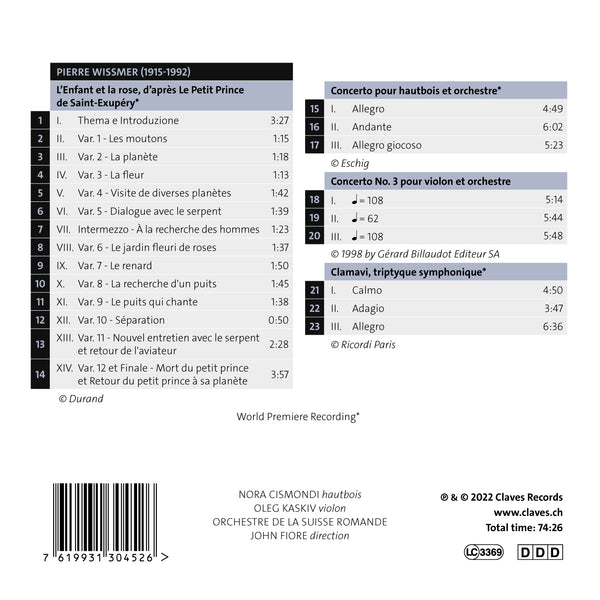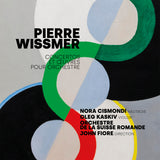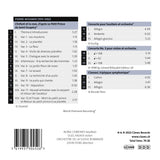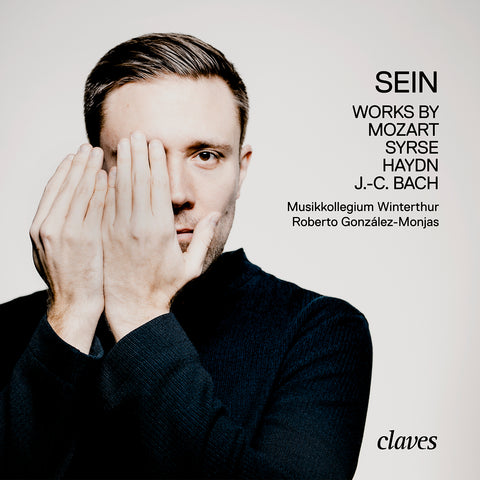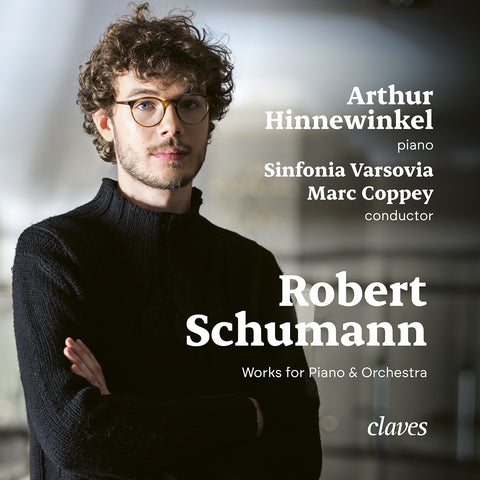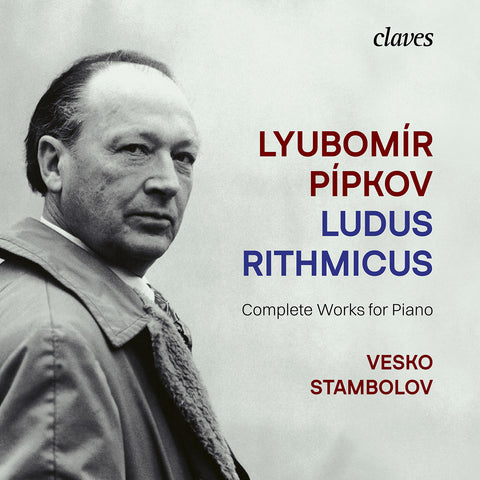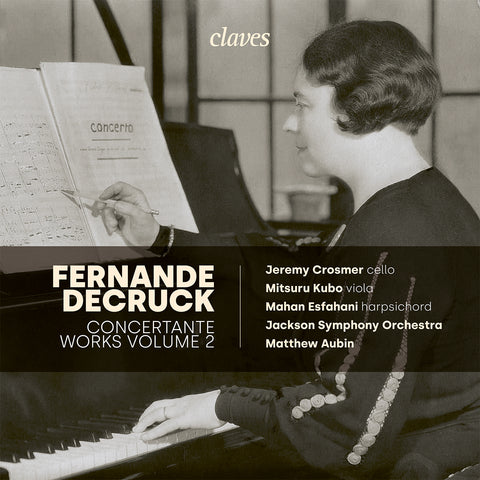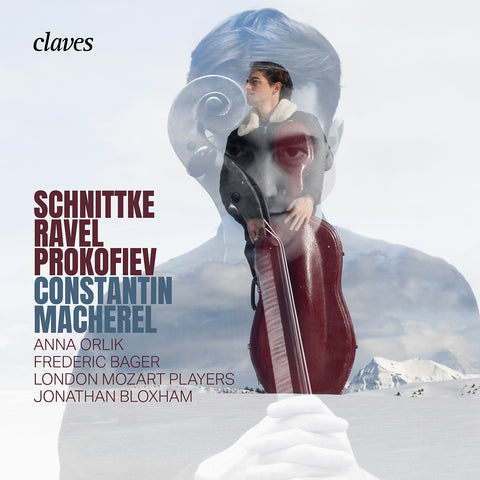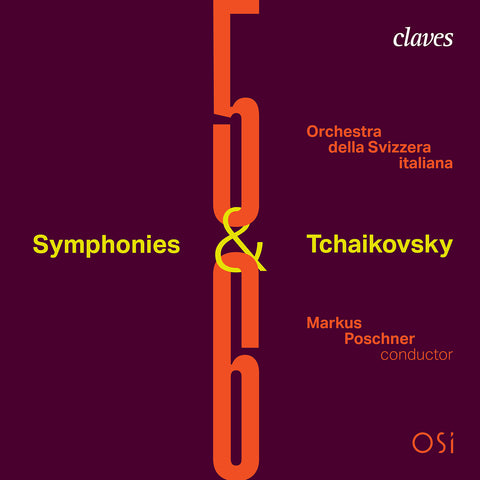(2022) Pierre Wissmer, Concertos et Œuvres orchestrales
Category(ies): Concerto Modern Orchestra Rarities
Instrument(s): Oboe Violin
Main Composer: Pierre Wissmer
Orchestra: Orchestre de la Suisse Romande
Conductor: John Fiore
CD set: 1
Catalog N°:
CD 3045
Release: 24.06.2022
EAN/UPC: 7619931304526
This album is now on repressing. Pre-order it at a special price now.
CHF 18.50
This album is no longer available on CD.
This album has not been released yet. Pre-order it from now.
CHF 18.50
This album is no longer available on CD.
CHF 18.50
VAT included for Switzerland & UE
Free shipping
This album is no longer available on CD.
VAT included for Switzerland & UE
Free shipping
This album is now on repressing. Pre-order it at a special price now.
CHF 18.50
This album is no longer available on CD.
This album has not been released yet.
Pre-order it at a special price now.
CHF 18.50
This album is no longer available on CD.
CHF 18.50
This album is no longer available on CD.
PIERRE WISSMER, CONCERTOS ET ŒUVRES ORCHESTRALES
PIERRE WISSMER OR THE POETRY OF THE SPIRIT
While twentieth century Swiss composers often synthesize the Latin and Germanic sources of their country’s inspiration in their aesthetics, it is to France that Pierre Wissmer (1915-1992) is resolutely attached, both in his life’s journey as in his artistic ideals.
Imbued at first with a post-Ravellian neoclassicism, over the years his style has shifted toward a more distanced relationship with tonality and a more inner language. However, the refinement of the contrapuntal writing and instrumentation will always remain a constant feauture of his art.
The orchestra occupies a preponderant position in his production. If he readily references classical structures, such as the symphony (composing nine of them between 1938 and 1989), or the concerto, he has likewise written free-form works whose construction continues to remain meticulously elaborate.
This is the case of Clamavi, a symphonic triptych composed in 1957 and premiered the same year on Radio-Genève as part of the International Red Cross Day. The most “Honeggerian” work of Wissmer, it is based on the Lutheran chorale Herr, nun lass in Frieden which runs through the three parts uninterruptedly. Each of the three sections is headed by a Biblical verse: "But woe to the earth and the sea, because the devil has gone down to you! He is filled with fury, because he knows that his time is short.” (Revelation XII.12)—”Let your gentleness be known to all men” (Philippians IV.5)—”Do not be afraid, O earth, but rejoice and be glad, for the Lord has done great things” (Joel II.21).
The first part expresses human anxieties and stands out in its harshness in a language bordering on atonality with a relentless rhythmic violence. The second section is a meditation on charity and love in a peaceful atmosphere with extensive solos by the oboe, violin and flute. The certainty of divine power permeates the third part wherein orchestral forces seem to struggle with the chorale. The latter asserts itself more and more clearly, and then a joyful motif from the brass leads to the peroration. Treated as a cantus firmus, the chorale finally prevails as proclaimed by the trombones and tuba, and the work ends in A major in a cheerful carillon of the entire orchestra.
That same year of 1957, Pierre Wissmer composed L’Enfant et la rose, a symphonic score inspired by Antoine de Saint-Exupéry’s The Little Prince. The composer did not use the original title on purpose as his goal was to recreate the poetic universe of the book devoid of any descriptive intention. The work bears the incription of the famous quotation “One can only see well with the heart, the essential is invisible to the eyes.” It is constructed in the form of twelve variations, very freely taking up the material set out in the introduction: a motif presented by the flute, then the main theme, a soaring melody in A minor performed by the whole orchestra. [..]
***
NORA CISMONDI Oboe
Born in Drôme (France), it is thanks to her first teacher Cesar Ognibene that Nora Cismondi was admitted to the CNSM of Paris at the age of 16 in the classes of Jean-Louis Capezzali, Jacques Tys and David Walter, and decided to devote herself to music.
After receiving first prizes in oboe and chamber music, she continued her studies with Maurice Bourgue. She is a laureate of the International Competitions of Prague Spring (2001), Toulon (2002), ARD of Münich (2003), Sonymusic Foundation Tokyo (2006). She performs as a soloist in many European venues and is supported by the French Ministry of Foreign Affairs and the French Association for Artistic Action for several tours in Asia and the Gulf States.
Recognized by her peers, she was named Classical Revelation by Adami in 2005 at the Midem in Cannes. After 7 seasons with the orchestra of the Opéra National de Paris, which she joined at the age of 20, Nora Cismondi joined the Orchestre National de France in 2006 as principal oboe.
At the same time, she is a regular guest of prestigious orchestras (LSO, Bayerische Rundfunk, Santa Cecilia), as well as internationally renowned ensembles such as the Budapest Festival Orchestra, the Mahler Chamber Orchestra and the Chamber Orchestra of Europe. She has collaborated with conductors such as Claudio Abbado, Nikolaus Harnoncourt, Bernard Haitink, Valery Gergiev and Daniele Gatti.
In 2018, she was appointed principal oboe of the Orchestre de la Suisse Romande.
Always happy to share her experience, she taught at the Conservatoire à rayonnement régional de Paris between 2012 and 2019. She regularly gives masterclasses in Asia, as well as in Europe and also sits on juries for international competitions.
On the recording front, she has collaborated with the clarinetist Florent Héau and the Prague Chamber Orchestra (Mozart’s Symphonie Concertante). Nora Cismondi has also participated in the recording of the complete chamber music of Henri Dutilleux, praised by Classica magazine (5 stars).
***
OLEG KASKIV Violin
Oleg Kaskiv was born in Kremenetz, Ukraine, in 1978. He first studied at the Krushelnytska Special School of Music, then at the Lysenke Conservatory in Lviv, Ukraine. During this period he won numerous prizes, including the International Dvarionas (Lithuania) and Kotorovych (Ukraine) Competitions. He joined the Menuhin Academy as a student in 1996, under the guidance of Alberto Lysy. Today he teaches violin and conducts the Academy orchestra. Since 2007, he also teaches at the Geneva Conservatory. Within the Menuhin Academy, he has played with the Camerata Lysy during world tours.
He has won numerous violin competitions, including the Queen Elisabeth International Music Competition (Belgium), the International Oistrakh Competition (Ukraine), the International Spohr Competition (Germany), the International Montreal Competition (Canada), the International Premio Lipizer (Italy), and the International Molinari Competition (Switzerland).
He has performed as a soloist with Camerata Lysy, Camerata de Lausanne, Orchestre National de Belgique, Orchestre Symphonique de Montréal, Baden-Baden Symphony Orchestra, Kiev National Orchestra, and Odessa Philharmonic Orchestra. Oleg Kaskiv plays the Giuseppe Guarneri filius violin of Andrea Cremona c. 1690 ex Rybin generously provided by a private Swiss sponsor.
See more albums by Oleg Kaskiv
***
ORCHESTRE DE LA SUISSE ROMANDE (OSR)
Since its creation by Ernest Ansermet in 1918, the Orchestre de la Suisse Romande has seen over 700 musicians contribute to its history. Currently led by Musical and Artistic Director Jonathan Nott, the OSR is made up of 112 permanent musicians represented by 16 different nationalities. It performs over 80 concerts every year, including 20 abroad.
In addition to subscription concerts in Geneva and Lausanne, it performs symphonic programmes for the City of Geneva and the annual United Nations Day concert and accompanies operatic performances at the Grand Théâtre of Geneva. Over the decades, the OSR has built up an international reputation thanks to its historic recordings and its interpretation of the 20th-century French and Russian repertories.
The British conductor Jonathan Nott has served as the OSR’s Music and Artistic Director since January 2017, following in the steps of the OSR’s founding head and successive music directors: Paul Kletzki (1967-1970), Wolfgang Sawallisch (1970-1980), Horst Stein (1980-1985), Armin Jordan (1985-1997), Fabio Luisi (1997-2002), Pinchas Steinberg (2002-2005), Marek Janowski (2005-2012), Neeme Järvi (2012-2015), and its principal guest conductor Kazuki Yamada (2012-2017). Under their guidance, the world-renowned OSR has actively contributed to the history of music through the discovery and support of contemporary composers. Works by Igor Stravinsky, Darius Milhaud, Arthur Honegger, Frank Martin, André-François Marescotti, Benjamin Britten, Witold Lutosławski, Heinz Holliger, William Blank, Péter Eötvös, James Macmillan, Pascal Dusapin and Michael Jarrell constitute just some of the OSR’s world premieres. The OSR has continually pursued the promotion and performance of new symphonic music, especially by Swiss composers, as one of its important missions. [..]
***
JOHN FIORE conductor
John Fiore has conducted in many of the world’s important opera houses and concert halls. American born and trained, Mr. Fiore’s life as a professional musician began at the age of 14, when he was hired to be the rehearsal pianist for the Seattle Opera’s Wagner Ring Cycle.
He studied at the Eastman School of Music, following which he became an assistant conductor in the three major American companies: San Francisco, Chicago, and New York City’s Metropolitan Opera. His official conducting debut was in 1986 with Gounod’s Faust at the San Francisco Opera, following which he made many debuts and formed continuing relationships–in North America, Europe and Australia–with among others, the Metropolitan Opera, Bavarian State Opera, Dresden’s Semperoper, Deutsche Oper Berlin, the Royal Swedish Opera and the Grand Théâtre de Genève, among others.
From 1999 to 2009, John Fiore was the Chief Conductor at the Deutsche Oper am Rhein, as well as the Generalmusikdirektor of the Düsseldorfer Symphoniker, and from 2009 to 2015, he was the Music Director of the Norwegian Opera and Ballet in Oslo, the first Music Director of that company in its new opera house. Also active as a symphonic conductor, John Fiore has conducted orchestras including the Boston Symphony, the Dresdner Staatskapelle, and the Orchestre de la Suisse Romande.
Some highlights of his life in music are his leading of the Metropolitan Opera’s premiere production of Dvořák’s Rusalka, the very first staged performances of Berlioz's Les Troyens in Sydney, the first complete Ring cycle in Prague since the Second World War (in co-production with the Deutsche Oper am Rhein); and concert performances of Schoenberg’s Gurrelieder in Düsseldorf and his own full evening arrangement of music from Wagner’s Ring in Oslo.
Since 2015, John Fiore has been enjoying a freelance career, and lives in Geneva.
REVIEWS
“[..] If this disc is any indication, the Swiss born composer should be far better known. The soloists are outstanding and the Orchestre de la Suisse Romande directed by John Fiore is first class. Apart from the violin concerto, all the works are world premiere recordings.” - Andrew Lorenz, November 2022
« [..] Ces oeuvres sont servies par des solistes d'exception, Nora Cismondi, hautbois solo de L'Orchestre de la Suisse romande. Et le violoniste ukrainien Oleg Kaskiv, à la merveilleuse sonorité. Et bien sûr, par L'Orchestre de la Suisse romande, dirigé avec dynamisme et précision par John Fiore. » - Jacques Bonnaure, septembre 2022
« [..] Abrupt, roide, noir, le Troisième Concerto pour violon compte au nombre des œuvres ultimes, structure libre, discours imprévisible, sans cesse fascinant par la virtuosité exigée du soliste mais aussi de l’orchestre. John Fiore conclu l’album avec une partition saisissante : le Clamavi de 1957, vaste triptyque qui bâtit ses abrupts sur un choral "Herr nun lass in Frieden", où Wissmer avoue l’influence décisive qu’eut Honegger sur son écriture d’orchestre. Partition impressionnante, transfigurée par un Orchestre de la Suisse Romande qui sait faire œuvre utile. Solistes parfaits, direction inspirée, et si John Fiore et les Romands se dévouaient à graver l’intégrale des Symphonies ? » - Jean-Charles Hoffelé, septembre 2022
« [..] Dans cet enregistrement effectué au Victoria Hall de Genève en juin 2021, l’Orchestre de la Suisse romande est dirigé par l’Américain John Fiore qui est un chef d’opéra réputé (Metropolitan, Opéra de Bavière ou de Dresde, Opéra de Suède, Grand Théâtre de Genève…). Installé à Genève depuis 2015 après plusieurs années passées au Deutsches Oper am Rhein puis à Düsseldorf, Fiore a choisi une carrière de freelance. Il apporte à ces pages, dont la découverte est enrichissante, un probant équilibre esthétique et en souligne avec soin toute l’originalité. Une longue tradition unit Wissmer à la phalange romande : par le passé, deux de ses directeurs musicaux éminents, Ernest Ansermet puis Paul Klecki, créateur de L’Enfant et la rose à Dallas en 1961, ont inscrit sa musique à leurs programmes. » - Jean Lacroix, juin 2022
« Quelques mois après un florilège de concertos (cf. no 701), Claves revient à Pierre Wissmer avec un programme varié et ambitieux illustrant la diversité d’inspiration du musicien français d’origine suisse. Gravées ici pour la première fois, deux partitions symphoniques de 1957 font le prix de cet album. Reposant sur un choral luthérien (Herr, nun lass in Frieden) le puissant triptyque Clamavi impressionne par des atmosphères et une saisissante puissance orchestrale rappelant celles de Honegger. Cycle de variations pour orchestre d’après le roman de Saint-Exupéry, L’Enfant et la rose est créé en 1961 par Paul Kletzki à Dallas. Ces vingt-cinq minutes, plutôt méditatives et poétiques, cherchent moins à illustrer des épisodes ou des personnages que la citation figurant en exergue « on ne voit bien qu’avec le cœur, l’essentiel est invisible pour les yeux ». L’Orchestre de la Suisse romande s’y investit magnifiquement, dans la tendresse des douze variations comme dans l’énergie avec laquelle John Fiore empoigne le grandiose Clamavi. [..] » - Jean-Claude Hulot, novembre 2022
« Claves se penche une troisième fois sur l’oeuvre du compositeur genevois Pierre Wissmer (1915-1992), avec une sortie dédiée à ses oeuvres concertantes et symphoniques. Si les deux premiers volets édités par le label suisse Claves convoquaient l’Hungarian Symphony Orchestra et l’Orchestre de Douai, cette fois-ci, rien de plus «local» qu’un Orchestre de la Suisse Romande (OSR) magistralement dirigée par John Fiore, dans une belle prise de son effectuée au Victoria Hall. Avec trois enregistrements en création mondiale, ce disque est marqué par une forte volonté de montrer le visage plus moderne du compositeur genevois. En effet son style, de prime abord, emprunte le chemin d’un néoclassicisme portant la marque de Stravinsky et Ravel, encore bien ancré dans la tonalité et rythmiquement enlevé. [..] » - Gianluigi Bocelli, mai 2022
“Compositional talent cannot be acquired, craftsmanship can; but fortunately the Swiss tone poet Pierre Wissmer (1915-1992) had both. The double album released in April last year by the Swiss music label (reviewed here) already testified to this. It brings me to the question why one composer is (or has become) more famous than the other. In my opinion, Wissmer deserves the same international stage as, for example, his fellow countrymen Othmar Schoeck (1886-1957), Arthur Honegger (1892-1955) or Frank Martin (1890-1974), but for some obscure reason this has not happened. [..] Wissmer wrote beautiful music, filled with spirituality, fascinating instrumentation art and melodic and harmonic fantasy. As beautifully performed as it is on this album, a closer look is certainly in order for anyone who wants to look beyond what is just about at their fingertips. The album will be released June the 24th.” - Aart van der Wal, June 2022
“L’Enfant et la Rose by Swiss composer Pierre Wissmer (1915-1992) is a wonderfully lively, colorful work. Programmatically, it is a series of twelve variations on Saint-Exupéry’s The Little Prince, to which the composer prefaced the quotation « One sees well only with the heart, the essential is invisible to the eyes. » A first set of five variations illustrates the episodes with the sheep, the planets, the flower and the dialogue with the snake. An intermezzo, ‘In Search of the People,’ leads to the second series of variations, with the episodes of the rose garden, the fox, the search for a fountain, the fountain that sings, then the separation from the pilot, the renewed dialogue with the snake, the return of the aviator and the death of the little prince. The imaginative charm of the composition, first performed by Paul Kletzki in 1961, is ravishing, and is fully appreciated in this splendid interpretation. With a contrasting Allegro, a wonderfully lyrical Andante and a fun final movement, the Oboe Concerto is no less enchanting a work in which French oboist Nora Cismindi shines. Violinist Oleg Kaskiv, born in Ukraine in 1978, plays the equally interesting Violin Concerto with great refinement. [..] In this piece, as in the rest of the program, the Orchestre de la Suisse Romande under the inspired conducting of John Fiore gives impeccable performances that give Wissmer’s music the quality it deserves.” - Remy Franck, June 2022
PIERRE WISSMER OR THE POETRY OF THE SPIRIT
While twentieth century Swiss composers often synthesize the Latin and Germanic sources of their country’s inspiration in their aesthetics, it is to France that Pierre Wissmer (1915-1992) is resolutely attached, both in his life’s journey as in his artistic ideals.
Imbued at first with a post-Ravellian neoclassicism, over the years his style has shifted toward a more distanced relationship with tonality and a more inner language. However, the refinement of the contrapuntal writing and instrumentation will always remain a constant feauture of his art.
The orchestra occupies a preponderant position in his production. If he readily references classical structures, such as the symphony (composing nine of them between 1938 and 1989), or the concerto, he has likewise written free-form works whose construction continues to remain meticulously elaborate.
This is the case of Clamavi, a symphonic triptych composed in 1957 and premiered the same year on Radio-Genève as part of the International Red Cross Day. The most “Honeggerian” work of Wissmer, it is based on the Lutheran chorale Herr, nun lass in Frieden which runs through the three parts uninterruptedly. Each of the three sections is headed by a Biblical verse: "But woe to the earth and the sea, because the devil has gone down to you! He is filled with fury, because he knows that his time is short.” (Revelation XII.12)—”Let your gentleness be known to all men” (Philippians IV.5)—”Do not be afraid, O earth, but rejoice and be glad, for the Lord has done great things” (Joel II.21).
The first part expresses human anxieties and stands out in its harshness in a language bordering on atonality with a relentless rhythmic violence. The second section is a meditation on charity and love in a peaceful atmosphere with extensive solos by the oboe, violin and flute. The certainty of divine power permeates the third part wherein orchestral forces seem to struggle with the chorale. The latter asserts itself more and more clearly, and then a joyful motif from the brass leads to the peroration. Treated as a cantus firmus, the chorale finally prevails as proclaimed by the trombones and tuba, and the work ends in A major in a cheerful carillon of the entire orchestra.
That same year of 1957, Pierre Wissmer composed L’Enfant et la rose, a symphonic score inspired by Antoine de Saint-Exupéry’s The Little Prince. The composer did not use the original title on purpose as his goal was to recreate the poetic universe of the book devoid of any descriptive intention. The work bears the incription of the famous quotation “One can only see well with the heart, the essential is invisible to the eyes.” It is constructed in the form of twelve variations, very freely taking up the material set out in the introduction: a motif presented by the flute, then the main theme, a soaring melody in A minor performed by the whole orchestra. [..]
***
NORA CISMONDI Oboe
Born in Drôme (France), it is thanks to her first teacher Cesar Ognibene that Nora Cismondi was admitted to the CNSM of Paris at the age of 16 in the classes of Jean-Louis Capezzali, Jacques Tys and David Walter, and decided to devote herself to music.
After receiving first prizes in oboe and chamber music, she continued her studies with Maurice Bourgue. She is a laureate of the International Competitions of Prague Spring (2001), Toulon (2002), ARD of Münich (2003), Sonymusic Foundation Tokyo (2006). She performs as a soloist in many European venues and is supported by the French Ministry of Foreign Affairs and the French Association for Artistic Action for several tours in Asia and the Gulf States.
Recognized by her peers, she was named Classical Revelation by Adami in 2005 at the Midem in Cannes. After 7 seasons with the orchestra of the Opéra National de Paris, which she joined at the age of 20, Nora Cismondi joined the Orchestre National de France in 2006 as principal oboe.
At the same time, she is a regular guest of prestigious orchestras (LSO, Bayerische Rundfunk, Santa Cecilia), as well as internationally renowned ensembles such as the Budapest Festival Orchestra, the Mahler Chamber Orchestra and the Chamber Orchestra of Europe. She has collaborated with conductors such as Claudio Abbado, Nikolaus Harnoncourt, Bernard Haitink, Valery Gergiev and Daniele Gatti.
In 2018, she was appointed principal oboe of the Orchestre de la Suisse Romande.
Always happy to share her experience, she taught at the Conservatoire à rayonnement régional de Paris between 2012 and 2019. She regularly gives masterclasses in Asia, as well as in Europe and also sits on juries for international competitions.
On the recording front, she has collaborated with the clarinetist Florent Héau and the Prague Chamber Orchestra (Mozart’s Symphonie Concertante). Nora Cismondi has also participated in the recording of the complete chamber music of Henri Dutilleux, praised by Classica magazine (5 stars).
***
OLEG KASKIV Violin
Oleg Kaskiv was born in Kremenetz, Ukraine, in 1978. He first studied at the Krushelnytska Special School of Music, then at the Lysenke Conservatory in Lviv, Ukraine. During this period he won numerous prizes, including the International Dvarionas (Lithuania) and Kotorovych (Ukraine) Competitions. He joined the Menuhin Academy as a student in 1996, under the guidance of Alberto Lysy. Today he teaches violin and conducts the Academy orchestra. Since 2007, he also teaches at the Geneva Conservatory. Within the Menuhin Academy, he has played with the Camerata Lysy during world tours.
He has won numerous violin competitions, including the Queen Elisabeth International Music Competition (Belgium), the International Oistrakh Competition (Ukraine), the International Spohr Competition (Germany), the International Montreal Competition (Canada), the International Premio Lipizer (Italy), and the International Molinari Competition (Switzerland).
He has performed as a soloist with Camerata Lysy, Camerata de Lausanne, Orchestre National de Belgique, Orchestre Symphonique de Montréal, Baden-Baden Symphony Orchestra, Kiev National Orchestra, and Odessa Philharmonic Orchestra. Oleg Kaskiv plays the Giuseppe Guarneri filius violin of Andrea Cremona c. 1690 ex Rybin generously provided by a private Swiss sponsor.
See more albums by Oleg Kaskiv
***
ORCHESTRE DE LA SUISSE ROMANDE (OSR)
Since its creation by Ernest Ansermet in 1918, the Orchestre de la Suisse Romande has seen over 700 musicians contribute to its history. Currently led by Musical and Artistic Director Jonathan Nott, the OSR is made up of 112 permanent musicians represented by 16 different nationalities. It performs over 80 concerts every year, including 20 abroad.
In addition to subscription concerts in Geneva and Lausanne, it performs symphonic programmes for the City of Geneva and the annual United Nations Day concert and accompanies operatic performances at the Grand Théâtre of Geneva. Over the decades, the OSR has built up an international reputation thanks to its historic recordings and its interpretation of the 20th-century French and Russian repertories.
The British conductor Jonathan Nott has served as the OSR’s Music and Artistic Director since January 2017, following in the steps of the OSR’s founding head and successive music directors: Paul Kletzki (1967-1970), Wolfgang Sawallisch (1970-1980), Horst Stein (1980-1985), Armin Jordan (1985-1997), Fabio Luisi (1997-2002), Pinchas Steinberg (2002-2005), Marek Janowski (2005-2012), Neeme Järvi (2012-2015), and its principal guest conductor Kazuki Yamada (2012-2017). Under their guidance, the world-renowned OSR has actively contributed to the history of music through the discovery and support of contemporary composers. Works by Igor Stravinsky, Darius Milhaud, Arthur Honegger, Frank Martin, André-François Marescotti, Benjamin Britten, Witold Lutosławski, Heinz Holliger, William Blank, Péter Eötvös, James Macmillan, Pascal Dusapin and Michael Jarrell constitute just some of the OSR’s world premieres. The OSR has continually pursued the promotion and performance of new symphonic music, especially by Swiss composers, as one of its important missions. [..]
***
JOHN FIORE conductor
John Fiore has conducted in many of the world’s important opera houses and concert halls. American born and trained, Mr. Fiore’s life as a professional musician began at the age of 14, when he was hired to be the rehearsal pianist for the Seattle Opera’s Wagner Ring Cycle.
He studied at the Eastman School of Music, following which he became an assistant conductor in the three major American companies: San Francisco, Chicago, and New York City’s Metropolitan Opera. His official conducting debut was in 1986 with Gounod’s Faust at the San Francisco Opera, following which he made many debuts and formed continuing relationships–in North America, Europe and Australia–with among others, the Metropolitan Opera, Bavarian State Opera, Dresden’s Semperoper, Deutsche Oper Berlin, the Royal Swedish Opera and the Grand Théâtre de Genève, among others.
From 1999 to 2009, John Fiore was the Chief Conductor at the Deutsche Oper am Rhein, as well as the Generalmusikdirektor of the Düsseldorfer Symphoniker, and from 2009 to 2015, he was the Music Director of the Norwegian Opera and Ballet in Oslo, the first Music Director of that company in its new opera house. Also active as a symphonic conductor, John Fiore has conducted orchestras including the Boston Symphony, the Dresdner Staatskapelle, and the Orchestre de la Suisse Romande.
Some highlights of his life in music are his leading of the Metropolitan Opera’s premiere production of Dvořák’s Rusalka, the very first staged performances of Berlioz's Les Troyens in Sydney, the first complete Ring cycle in Prague since the Second World War (in co-production with the Deutsche Oper am Rhein); and concert performances of Schoenberg’s Gurrelieder in Düsseldorf and his own full evening arrangement of music from Wagner’s Ring in Oslo.
Since 2015, John Fiore has been enjoying a freelance career, and lives in Geneva.
REVIEWS
“[..] If this disc is any indication, the Swiss born composer should be far better known. The soloists are outstanding and the Orchestre de la Suisse Romande directed by John Fiore is first class. Apart from the violin concerto, all the works are world premiere recordings.” - Andrew Lorenz, November 2022
« [..] Ces oeuvres sont servies par des solistes d'exception, Nora Cismondi, hautbois solo de L'Orchestre de la Suisse romande. Et le violoniste ukrainien Oleg Kaskiv, à la merveilleuse sonorité. Et bien sûr, par L'Orchestre de la Suisse romande, dirigé avec dynamisme et précision par John Fiore. » - Jacques Bonnaure, septembre 2022
« [..] Abrupt, roide, noir, le Troisième Concerto pour violon compte au nombre des œuvres ultimes, structure libre, discours imprévisible, sans cesse fascinant par la virtuosité exigée du soliste mais aussi de l’orchestre. John Fiore conclu l’album avec une partition saisissante : le Clamavi de 1957, vaste triptyque qui bâtit ses abrupts sur un choral "Herr nun lass in Frieden", où Wissmer avoue l’influence décisive qu’eut Honegger sur son écriture d’orchestre. Partition impressionnante, transfigurée par un Orchestre de la Suisse Romande qui sait faire œuvre utile. Solistes parfaits, direction inspirée, et si John Fiore et les Romands se dévouaient à graver l’intégrale des Symphonies ? » - Jean-Charles Hoffelé, septembre 2022
« [..] Dans cet enregistrement effectué au Victoria Hall de Genève en juin 2021, l’Orchestre de la Suisse romande est dirigé par l’Américain John Fiore qui est un chef d’opéra réputé (Metropolitan, Opéra de Bavière ou de Dresde, Opéra de Suède, Grand Théâtre de Genève…). Installé à Genève depuis 2015 après plusieurs années passées au Deutsches Oper am Rhein puis à Düsseldorf, Fiore a choisi une carrière de freelance. Il apporte à ces pages, dont la découverte est enrichissante, un probant équilibre esthétique et en souligne avec soin toute l’originalité. Une longue tradition unit Wissmer à la phalange romande : par le passé, deux de ses directeurs musicaux éminents, Ernest Ansermet puis Paul Klecki, créateur de L’Enfant et la rose à Dallas en 1961, ont inscrit sa musique à leurs programmes. » - Jean Lacroix, juin 2022
« Quelques mois après un florilège de concertos (cf. no 701), Claves revient à Pierre Wissmer avec un programme varié et ambitieux illustrant la diversité d’inspiration du musicien français d’origine suisse. Gravées ici pour la première fois, deux partitions symphoniques de 1957 font le prix de cet album. Reposant sur un choral luthérien (Herr, nun lass in Frieden) le puissant triptyque Clamavi impressionne par des atmosphères et une saisissante puissance orchestrale rappelant celles de Honegger. Cycle de variations pour orchestre d’après le roman de Saint-Exupéry, L’Enfant et la rose est créé en 1961 par Paul Kletzki à Dallas. Ces vingt-cinq minutes, plutôt méditatives et poétiques, cherchent moins à illustrer des épisodes ou des personnages que la citation figurant en exergue « on ne voit bien qu’avec le cœur, l’essentiel est invisible pour les yeux ». L’Orchestre de la Suisse romande s’y investit magnifiquement, dans la tendresse des douze variations comme dans l’énergie avec laquelle John Fiore empoigne le grandiose Clamavi. [..] » - Jean-Claude Hulot, novembre 2022
« Claves se penche une troisième fois sur l’oeuvre du compositeur genevois Pierre Wissmer (1915-1992), avec une sortie dédiée à ses oeuvres concertantes et symphoniques. Si les deux premiers volets édités par le label suisse Claves convoquaient l’Hungarian Symphony Orchestra et l’Orchestre de Douai, cette fois-ci, rien de plus «local» qu’un Orchestre de la Suisse Romande (OSR) magistralement dirigée par John Fiore, dans une belle prise de son effectuée au Victoria Hall. Avec trois enregistrements en création mondiale, ce disque est marqué par une forte volonté de montrer le visage plus moderne du compositeur genevois. En effet son style, de prime abord, emprunte le chemin d’un néoclassicisme portant la marque de Stravinsky et Ravel, encore bien ancré dans la tonalité et rythmiquement enlevé. [..] » - Gianluigi Bocelli, mai 2022
“Compositional talent cannot be acquired, craftsmanship can; but fortunately the Swiss tone poet Pierre Wissmer (1915-1992) had both. The double album released in April last year by the Swiss music label (reviewed here) already testified to this. It brings me to the question why one composer is (or has become) more famous than the other. In my opinion, Wissmer deserves the same international stage as, for example, his fellow countrymen Othmar Schoeck (1886-1957), Arthur Honegger (1892-1955) or Frank Martin (1890-1974), but for some obscure reason this has not happened. [..] Wissmer wrote beautiful music, filled with spirituality, fascinating instrumentation art and melodic and harmonic fantasy. As beautifully performed as it is on this album, a closer look is certainly in order for anyone who wants to look beyond what is just about at their fingertips. The album will be released June the 24th.” - Aart van der Wal, June 2022
“L’Enfant et la Rose by Swiss composer Pierre Wissmer (1915-1992) is a wonderfully lively, colorful work. Programmatically, it is a series of twelve variations on Saint-Exupéry’s The Little Prince, to which the composer prefaced the quotation « One sees well only with the heart, the essential is invisible to the eyes. » A first set of five variations illustrates the episodes with the sheep, the planets, the flower and the dialogue with the snake. An intermezzo, ‘In Search of the People,’ leads to the second series of variations, with the episodes of the rose garden, the fox, the search for a fountain, the fountain that sings, then the separation from the pilot, the renewed dialogue with the snake, the return of the aviator and the death of the little prince. The imaginative charm of the composition, first performed by Paul Kletzki in 1961, is ravishing, and is fully appreciated in this splendid interpretation. With a contrasting Allegro, a wonderfully lyrical Andante and a fun final movement, the Oboe Concerto is no less enchanting a work in which French oboist Nora Cismindi shines. Violinist Oleg Kaskiv, born in Ukraine in 1978, plays the equally interesting Violin Concerto with great refinement. [..] In this piece, as in the rest of the program, the Orchestre de la Suisse Romande under the inspired conducting of John Fiore gives impeccable performances that give Wissmer’s music the quality it deserves.” - Remy Franck, June 2022
Return to the album | Read the booklet | Composer(s): Pierre Wissmer | Main Artist: Oleg Kaskiv
STUDIO MASTER (HIGH-RESOLUTION AUDIO)
Concerto
Gérard Billaudot Éditeur
High-resolution audio - Studio master quality
In stock
John Fiore
Joker - Crescendo Magazine
Modern
Nora Cismondi
Oboe
Oleg Kaskiv - violin
Orchestra
Orchestre de la Suisse Romande (OSR)
Pierre Wissmer (1915-1992)
Rarities
Violin
World Premiere Recording
Concerto
Gérard Billaudot Éditeur
High-resolution audio - Studio master quality
In stock
John Fiore
Joker - Crescendo Magazine
Modern
Nora Cismondi
Oboe
Oleg Kaskiv - violin
Orchestra
Orchestre de la Suisse Romande (OSR)
Pierre Wissmer (1915-1992)
Rarities
Violin
World Premiere Recording






